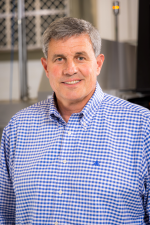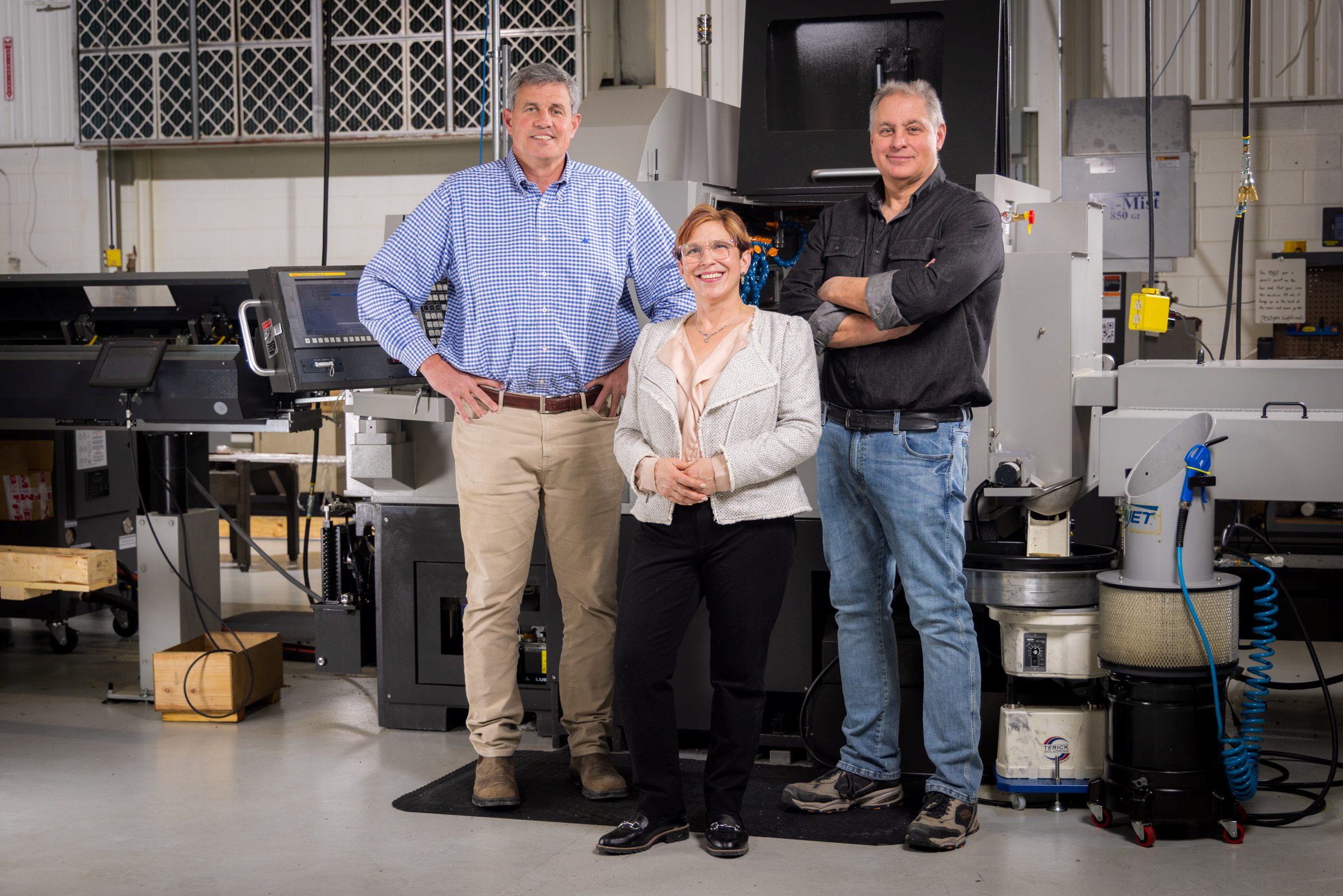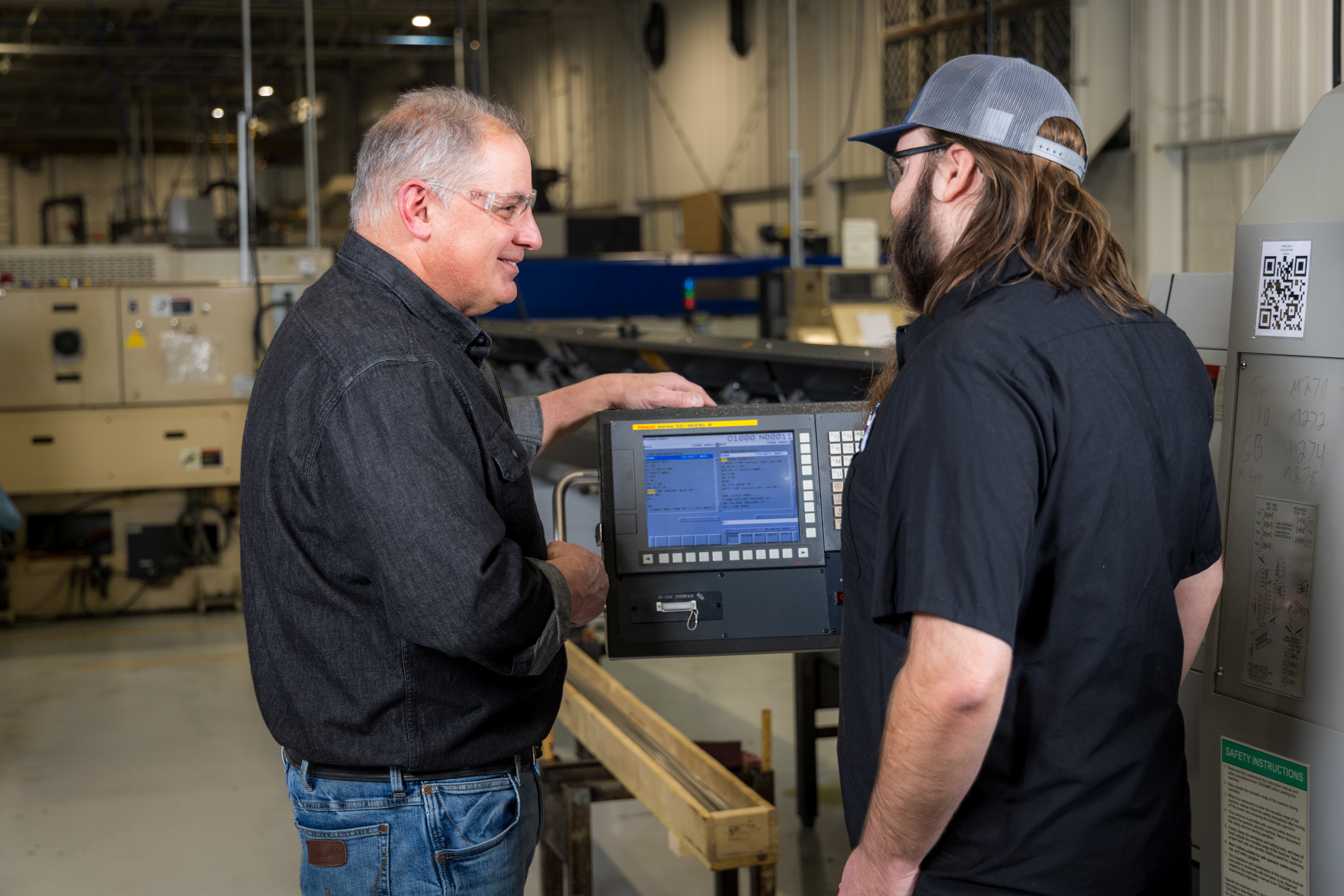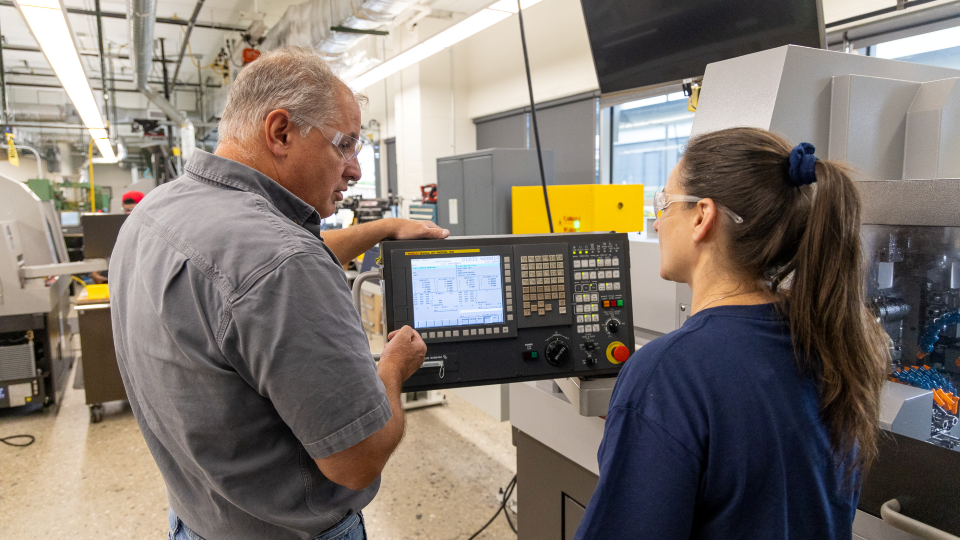In the next five to 10 years, trillions of dollars of industrial capacity will be trying to find a home, and what better place than right here in Wisconsin.
Bill Berrien envisions a new golden age of American manufacturing glimmering on the horizon.
To make it happen, companies must think innovatively, act creatively and invest in training, as well as in technology.
“With the right programs and the right attitude, this could be an epic opportunity for Wisconsin,” said Berrien, CEO of Pindel Global Precision in New Berlin. “In the next five to 10 years, trillions of dollars of industrial capacity will be trying to find a home, and what better place than right here in Wisconsin.”
 Berrien, a former Navy SEAL, has started investing in that future. He has partnered with Milwaukee Area Technical College’s Workforce Solutions team to have three Pindel employees receive customized training in computer numerical control Swiss machining at the college’s Downtown Milwaukee Campus.
Berrien, a former Navy SEAL, has started investing in that future. He has partnered with Milwaukee Area Technical College’s Workforce Solutions team to have three Pindel employees receive customized training in computer numerical control Swiss machining at the college’s Downtown Milwaukee Campus.
Swiss machine tooling, also known as Swiss machining or Swiss-type lathes, is a CNC-operated manufacturing technique that originated with the needs of the swiss watch industry a century ago. Today, it’s automated and specialized machinery that cuts and tools metal into complex, small, or delicate parts, some with very tight tolerances.
In 2012, Berrien acquired Pindel, founded in 1947, a contract manufacturer that machines components for other, larger manufacturers. He has expanded operations to machine complete parts in a single operation and to machine extremely complex, high-precision components, like ones used in the space and aerospace industry. The company can deliver orders of between 1,000 pieces and 3 million pieces.
When he wanted the company’s employees to learn how to operate Swiss machines, he turned to MATC.
“The equipment at MATC is awesome,” Berrien said. “The Swiss lab is state of the art and the curriculum is without peer nationally.” Plus, Berrien knew MATC CNC instructor Chris Chomicki from when Chomicki worked at Rockwell Automation.
MATC’s Workforce Solutions team, led by account manager Robin Hoke, helped Berrien and Chomicki condense the college’s 190-hour Swiss Machining 1 course into 64 hours of training.
“Workforce Solutions can customize training solutions and outcomes to meet the needs of business and industry,” Hoke said. “Working with Pindel showcases the expertise of MATC's instructors who maintain deep connections with industry. We have the capability to deliver technical skills, soft skills training with on-demand modules to assist employees with career development across industry sectors.”
Chomicki trained the three Pindel employees two days a week from June 6 to August 2. The workers were at MATC from 8 a.m. to 2 p.m., allowing them to train for part of the day and work at Pindel for the remainder, immediately applying what they learned.
“They could balance work and education without putting one on hold,” Berrien said.
The participants learned shop safety, setup and control, basic machining calculations, and troubleshooting. “This is the meat and potatoes of the Swiss course,” Chomicki said. “This pilot course will help us validate what outcomes are taught and test the right model. In the future, we will add other companies’ employees to this Swiss 1 class and additional Swiss 2 and Swiss 3 classes.”
“It’s great being able to get the training here and then going back to work and applying it right away,” said Jennilee Orlowski, one of the Pindel employees. “I like the whole process.”
“Chris is a great teacher,” Orlowski added. “He’s patient. With the class having only three people, he can give us extra time and attention if we need it.”
This kind of attention and training is vital to revitalizing American manufacturing, Berrien said. Industries need to continually enhance and expand the skills of their team members as technology evolves and market needs change — what Berrien prefers to call forwardskilling, rather than upskilling.
For Berrien, forwardskilling uses available training resources – like Uber did with cars and Airbnb did with spare rooms – to quickly train workers. That approach creates more value for the company and the employee and at scale, he said.
“One of the mistaken beliefs in America we have to address is that what you learn in the first 25 years of your life will last you the next 50 years of your life,” Berrien said. “Nothing could be farther from the truth in a world of changing technologies, changing industry needs and changing personal interests.”
Forwardskilling creates opportunities for promotions and increased pay for workers, improves employee retention, and lowers turnover rate. It also allows individuals to “always stay in the fight” throughout their work lives and creates the reality that ‘your address (where you grew up, where you live, the quality of the K-12 school you attended) is not your destiny’. “Or, as I say to my Spanish-speaking industry colleagues, ‘La dirección no debe ser el destino,” Berrien said.
“When you add value to the employee, you add value to the company and you add value to the ‘industrial commons’ making the manufacturing community, and the country, stronger,” he said.
Berrien has created a consortium called ForwardSkillingSM, recruiting other manufacturers to share training opportunities, like MATC’s Workforce Solutions, that already exist in the marketplace yet aren’t visible to all companies.
Berrien conceived the ForwardSkillingSM consortium (‘Forward’ has been the Wisconsin motto since 1851) in 2019 while participating in the Presidential Leadership Scholars program, a unique mid-career leadership program founded by Presidents George W. Bush, BIll Clinton, George H.W. Bush and the Lyndon Johnson Presidential Foundation. The six-month program hones the leadership abilities of each annual cohort through interactions with and instruction from the former Presidents, former cabinet members and key administration officials, leading academics, and business and civic leaders.
Berrien plans to send more Pindel employees to MATC Workforce Solutions for training, and he hopes other manufacturers will follow his lead to create the highly skilled workforce needed for a manufacturing ‘golden era’ in the state.
“Wisconsin has this amazing 120-year-old manufacturing ecosystem, one of the most robust in the world, with a highly-trained and highly-trainable workforce that can be augmented with automation and artificial intelligence to create tremendous value,” he said.
“There is an ongoing renaissance in manufacturing in this country as well as massive reshoring of manufacturing. To catch this opportunity for Wisconsin over the next five to ten years, we need to think differently about lifelong people development because, if we don’t, that opportunity will go someplace else,” Berrien added. “We should be, and we will be, the manufacturing powerhouse to the world – again.”
About MATC’s Workforce Solutions: MATC’s Workforce Solutions recognizes that the professional development needs of every organization are unique. Our results-oriented customized training programs increase employee productivity and improve your company’s ability to reduce costs and increase revenue. Training can be delivered at MATC or on-site and on a schedule that is most convenient to your business operation. Training opportunities currently available include Business, Leadership & Professional Development, Industry Specific Training, Short-term Micro Credentials and Certifications. If you are interested in more information contact Robin Hoke, Account Manager Workforce Solutions at Hoker@matc.edu.
About MATC: As Wisconsin’s largest technical college and one of the most diverse two-year institutions in the Midwest, Milwaukee Area Technical College is a key driver of southeastern Wisconsin’s economy and has provided innovative education in the region since 1912. Nearly 30,000 students per year attend the college’s four campuses and community-based sites or learn online. MATC offers affordable and accessible education and training opportunities that empower and transform lives in the community. The college offers more than 180 academic programs; and transfer options leading to bachelor’s degrees with more than 40 four-year colleges and universities. Overwhelmingly, MATC graduates build careers and businesses in southeastern Wisconsin. The college is accredited by the Higher Learning Commission.




